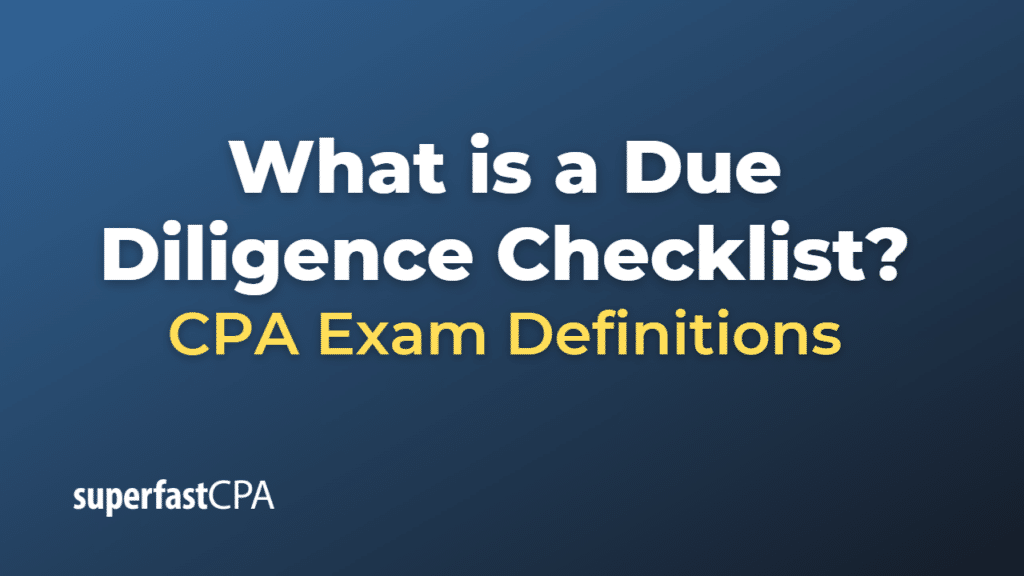Due Diligence Checklist
A due diligence checklist is a comprehensive list of items that need to be reviewed during the due diligence process before a business transaction, such as a merger, acquisition, or investment. The checklist is designed to ensure a thorough investigation and to help prevent any important details or potential issues from being overlooked.
The exact items on a due diligence checklist can vary depending on the nature of the transaction and the industries of the parties involved. However, a due diligence checklist generally covers the following categories:
- Corporate Structure and Governance: This includes reviewing the company’s legal structure, corporate charters, bylaws, minutes of board meetings, and shareholder agreements.
- Financials: This involves reviewing the company’s financial statements, tax returns, budgets, projections, debt instruments, and details of any off-balance sheet obligations.
- Contracts: Key business contracts, such as customer contracts, supplier agreements, leases, licensing agreements, and partnership agreements, should be reviewed.
- Legal Matters: Any ongoing or potential litigation, regulatory issues, or compliance concerns should be reviewed. This can also include reviewing intellectual property protections and employment laws compliance.
- Operations: This includes reviewing the company’s operational processes, supply chains, technology systems, and details of its physical assets. It also involves reviewing employee roles and contracts, and health and safety records.
- Market and Competition: This involves reviewing the company’s market position, competitive landscape, marketing strategies, and customer base.
- Environmental Issues: This can include assessing the company’s environmental impact, compliance with environmental regulations, and any potential environmental liabilities.
It’s important to note that this is a high-level overview, and the specific details on a due diligence checklist can be far more detailed and extensive. The due diligence process can be complex and time-consuming, but it is a crucial step to identify potential risks and ensure a successful transaction.
Example of a Due Diligence Checklist
Let’s imagine that an investor is considering purchasing a significant stake in a manufacturing company. Their due diligence checklist might look something like this:
1. Corporate Structure and Governance:
- Articles of Incorporation
- Bylaws
- Minutes from recent board and committee meetings
- List of shareholders and share ownership details
- Details of any subsidiaries or affiliates
2. Financial Information:
- Financial statements for the last three to five years (balance sheets, income statements, cash flow statements)
- Most recent interim financial statements
- Auditors’ reports
- Detailed schedule of assets and liabilities
- Information on any debt, including terms and conditions
3. Contracts:
- Major supply contracts
- Major customer contracts
- Any joint venture, partnership or cooperation agreements
- Lease agreements
- Contracts with contractors or consultants
4. Legal Matters:
- List of any ongoing or threatened litigation
- Regulatory compliance documentation
- Intellectual property registrations and any disputes
- Employment contracts and details of any labor disputes
5. Operations:
- Details of manufacturing processes
- Overview of suppliers and supply chain management
- List of key personnel and their roles
- Employee compensation and benefit plans
- Information about the company’s IT systems and cybersecurity measures
6. Market and Competition:
- Market research reports
- Overview of main competitors and the company’s competitive positioning
- Marketing strategies and promotional materials
7. Environmental Issues:
- Environmental impact assessments
- Compliance with environmental regulations
- Details of any potential environmental liabilities
Remember, this is a simplified example. Depending on the complexity of the business and the nature of the transaction, a real-world due diligence checklist could be much more detailed and extensive. It’s also important to involve experts, like lawyers, accountants, and industry specialists, in the due diligence process to ensure that nothing is overlooked.













